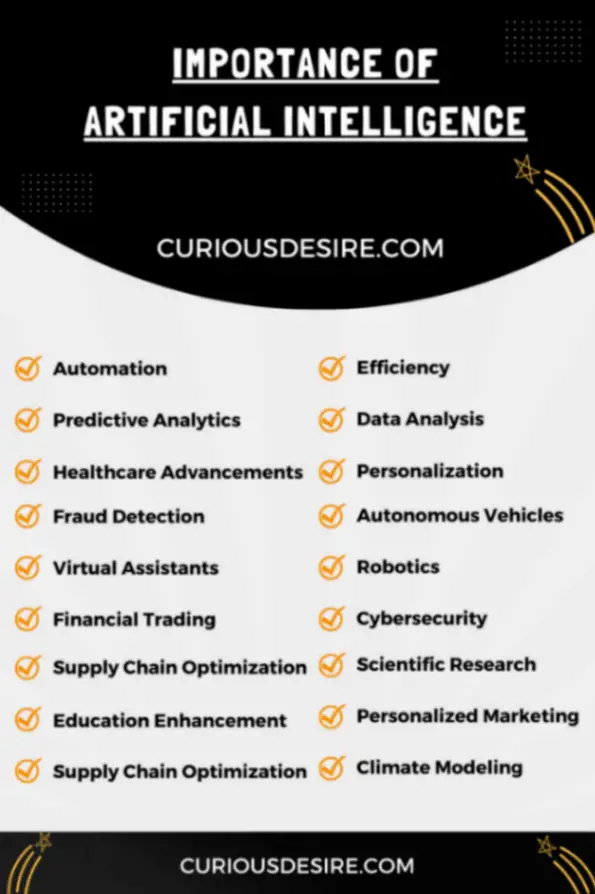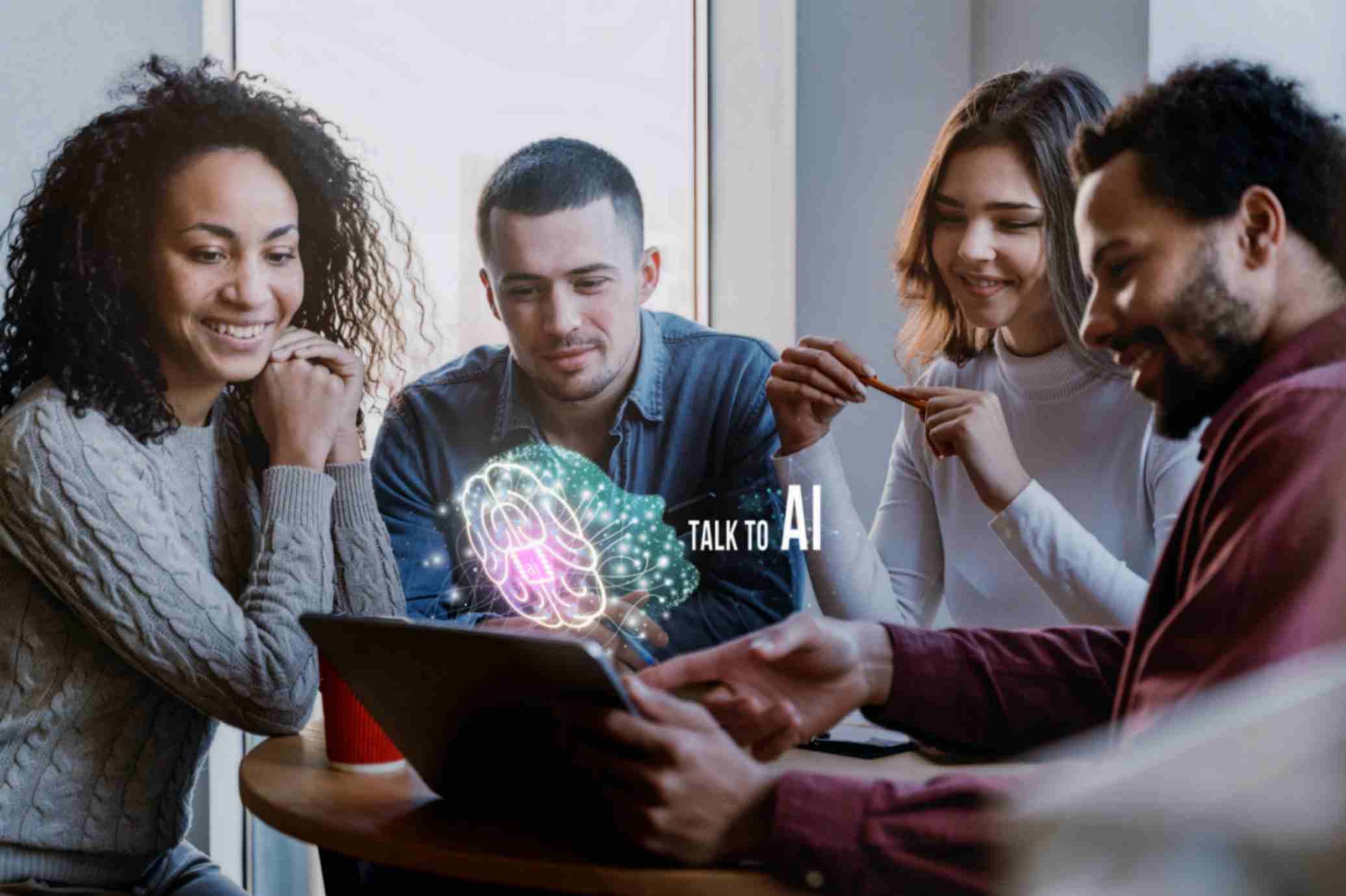In today’s rapidly evolving technological landscape, the importance of Artificial Intelligence (AI) cannot be overstated.
As a powerful force driving innovation, AI has become an integral part of our daily lives and various industries, fundamentally transforming the way we work, learn, and interact.
In this article, we explore 20 key facets that highlight the significance of AI, ranging from automation and efficiency to healthcare advancements, data analysis, and personalized experiences.
Each aspect sheds light on how AI, with its capacity for data processing, pattern recognition, and decision-making, not only streamlines processes but also propels us into a future marked by smarter, more adaptive systems.
Here are the 5 most common reasons for the importance of artificial intelligence:
- Automation
- Data Analysis
- Personalization
- Cybersecurity
- Predictive Analytics
1. Automation
Artificial Intelligence (AI) serves as the backbone of automation, revolutionizing how tasks are accomplished with speed and precision. Automation is like having a high-tech assistant that can do tasks without needing constant supervision.
Think about a factory where robots assemble products. With automation, these robots can work tirelessly, doing repetitive jobs more quickly and precisely than humans. This not only saves time but also reduces errors.
As technology advances, automation is becoming more widespread, from self-checkout kiosks in stores to automated customer service chatbots online.
The beauty of automation lies in making routine tasks easier, freeing up human efforts for more creative and complex journeys.
2. Efficiency
Efficiency is all about doing things in the smartest and fastest way possible. It’s like finding the quickest route to your destination.
In various industries, especially with the help of technology like AI, efficiency means streamlining processes to get better results with less time and resources.
For example, in a business setting, efficiency could involve using AI algorithms to analyze data and identify the most effective strategies.
Ultimately, efficiency is like having a well-oiled machine, ensuring tasks are completed most optimally, promoting productivity, and saving both time and costs.
3. Data Analysis
Data analysis is like being a detective, but instead of solving crimes, you’re uncovering valuable insights hidden in massive amounts of information. With the rise of technology, especially AI, data analysis has become incredibly powerful.
Picture a giant puzzle—data analysis is the process of putting those pieces together to reveal a meaningful picture. For instance, in business, data analysis might involve studying customer preferences to improve products or services.
The significance of data analysis lies in its ability to inform decision-making, identify trends, and even predict future outcomes. It’s like having a super-sleuth that helps businesses and researchers make informed choices based on the story told by the data.
4. Predictive Analytics
The role of AI in predictive analytics mirrors foreseeing future trends by discerning patterns from past data, analogous to a weather forecast predicting upcoming conditions.
In business applications, predictive analytics becomes a strategic asset, allowing proactive responses to market trends, minimizing risks, and maximizing opportunities.
The ongoing refinement of AI algorithms propels predictive analytics into an even more impactful role, influencing domains such as disease prediction and the optimization of intricate supply chains.
5. Personalization
Personalization is all about tailoring experiences to fit your unique preferences. Imagine an online shopping website suggesting items based on your past purchases or a streaming service recommending movies similar to your favorite genres.
With the help of AI, personalization goes beyond one-size-fits-all approaches. It creates a more customized and enjoyable experience by understanding your habits, likes, and dislikes.
In essence, personalization is like having a virtual assistant that knows your tastes and makes suggestions, enhancing user satisfaction and engagement.
As technology advances, the future of personalization holds the promise of even more precise and intuitive customization in various aspects of our digital interactions.
6. Healthcare Advancements
In the world of healthcare, artificial intelligence (AI) acts like a superhero, helping doctors and researchers make big strides. For instance, AI can analyze tons of medical data quickly, helping doctors spot diseases early or suggesting personalized treatments.
Think of it as a wise assistant for healthcare professionals, making their jobs easier and improving the chances of successful treatments. Looking ahead, AI in healthcare promises even more breakthroughs, from faster diagnosis to discovering new medicines.
7. Fraud Detection
When it comes to keeping our money safe, AI is like a vigilant guardian. In sectors like banking and finance, advanced algorithms, often powered by AI, analyze patterns and behaviors to identify any unusual or suspicious activities that might indicate fraud.
It’s like having a smart detective who scrutinizes transactions and activities to catch potential wrongdoings before they can cause harm.
As technology evolves, the capabilities of AI in fraud detection become even sharper, creating a safer environment for financial transactions by preemptively identifying and preventing fraudulent actions.
8. Natural Language Processing (NLP)
Have you ever wondered how your voice-activated devices understand your commands? Enter Natural Language Processing (NLP), a facet of AI designed to make computers comprehend human language seamlessly.
Whether conversing with your phone or interacting with a chatbot, NLP allows computers to grasp, interpret, and respond to human language, making these interactions more intuitive and fluid.
As technology progresses, the future holds the promise of even more sophisticated NLP, allowing computers to understand us with greater precision.
9. Image and Speech Recognition
Imagine a world where your computer perceives and comprehends information similarly to how you do. AI, in the realms of image and speech recognition, brings this closer to reality. It facilitates your phone in recognizing your face for unlocking or comprehending your voice commands.
Industries such as security and healthcare leverage AI to analyze images for potential threats or diagnose medical conditions. The continuous evolution of AI promises more accurate and versatile applications of image and speech recognition in our daily lives.
10. Virtual Assistants
AI-powered virtual assistants, akin to personal helpers embedded in our devices, redefine convenience. Siri, Alexa, or Google Assistant exemplify these AI companions, capable of answering questions, setting reminders, and engaging in conversations.
Their integration into our routines simplifies tasks and provides instant access to information.
As technology advances, virtual assistants are poised to become even more indispensable, seamlessly adapting to our evolving needs and enhancing overall responsiveness.
11. Autonomous Vehicles
Autonomous vehicles, driven by smart AI systems, lead us to a future where travel isn’t just easy but much safer.
These vehicles use a combination of sensors, cameras, and AI algorithms to navigate roads, making decisions about speed, direction, and potential obstacles.
The importance of autonomous vehicles lies not just in the convenience of hands-free driving but also in their potential to enhance road safety by reducing human errors.
As AI continues to advance, autonomous vehicles promise a future where transportation is not only more efficient but also safer and more accessible for everyone.
12. Decision Support Systems
Think of decision support systems as wise advisors in the business world. These systems, fueled by AI, help organizations make informed choices by analyzing data and providing valuable insights.
For example, a decision support system might help a company decide on the best marketing strategy based on consumer trends.
These systems act as an important aid for human decision-makers, ensuring that choices are backed by data-driven intelligence.
Looking forward, as AI becomes more sophisticated, decision support systems will likely play an increasingly vital role in shaping strategic decisions across various industries.
13. Robotics
Robotics is like having helpful, mechanical assistants that can perform tasks autonomously. These machines, often designed with AI capabilities, are programmed to execute specific functions.
In industries, robotics can take on repetitive or dangerous jobs, enhancing efficiency and safety. For example, robots might assemble products in a factory or assist in surgeries in healthcare.
The importance of robotics lies in their ability to augment human capabilities, increasing productivity and reducing the risk in tasks that might be hazardous or monotonous for humans.
As technology advances, robotics holds the promise of playing a more integral role in various aspects of our daily lives and industries.
14. Cybersecurity
Cybersecurity is like having a digital shield that protects your online world from potential threats. It involves practices, technologies, and measures designed to safeguard computer systems, networks, and data from unauthorized access, attacks, or damage.
In a world where we conduct a significant part of our lives online, from banking to socializing, cybersecurity is important. Think of it as a digital guardian that uses firewalls, encryption, and advanced algorithms, often powered by AI, to detect and prevent cyber threats.
The importance of cybersecurity lies in ensuring the confidentiality, integrity, and availability of information, safeguarding individuals and organizations from the ever-evolving landscape of cyber threats.
As technology advances, the role of cybersecurity becomes increasingly pivotal in maintaining a secure and trustworthy digital environment.
15. Financial Trading
In the fast-paced world of financial markets, AI plays an important role in optimizing trading strategies. Automated trading systems, driven by AI algorithms, can analyze market data at speeds beyond human capability, executing trades with precision.
This not only increases the efficiency of financial transactions but also allows strategies based on complex data patterns. The importance of AI in financial trading lies in its ability to respond swiftly to market changes, manage risks, and capitalize on opportunities.
As technology advances, the integration of AI in financial trading is expected to continue, shaping the landscape of global financial markets.
16. Supply Chain Optimization
Supply Chain Optimization is like making a well-organized plan for how things move from the manufacturer to the customer. It involves using smart systems, often powered by Artificial Intelligence (AI), to manage the flow of products efficiently.
From predicting demand and managing inventory to choosing the best routes for transportation, Supply Chain Optimization ensures that products get to where they need to be on time and at the lowest cost.
As AI continues to evolve, supply chain optimization becomes a key player in creating more responsive, efficient, and resilient supply chains, adapting dynamically to changing market conditions.
17. Education Enhancement
In the realm of education, AI acts as a supportive tutor, customizing learning experiences for individual students. AI can analyze student performance data to identify strengths and weaknesses, tailoring lessons to suit individual needs.
This personalized approach enhances student engagement and understanding.
Looking ahead, as AI becomes more integrated into education, it holds the potential to revolutionize learning by providing adaptive content, facilitating remote education, and promoting a more inclusive and effective educational experience.
18. Climate Change Modeling
Climate change modeling is a bit like predicting the weather but on a much larger scale. Imagine having a super-smart computer that can analyze tons of data about the Earth’s atmosphere, oceans, and other factors.
This computer, often powered by AI, helps scientists make predictions about how the climate might change over time. For example, it can simulate the impact of human activities on the environment, like deforestation or greenhouse gas emissions.
By understanding these simulations, scientists can suggest ways to lessen the impact of climate change and work towards a more sustainable future.
So, climate change modeling with AI is like having a crystal ball that helps us prepare for and adapt to the changes happening in our world.
19. Personalized Marketing
Personalized marketing is pretty important in the business world. It’s like when you’re shopping online, and the ads and suggestions seem to know exactly what you’re into. Let’s say you love sports shoes.
With personalized marketing, the online store might show you the latest basketball sneakers or running shoes because it knows your interests.
This not only makes your shopping experience more enjoyable but also helps businesses sell things that match your preferences. It’s like having a shopping assistant who understands your style and makes shopping a breeze.
20. Scientific Research
Scientific research, empowered by AI, is vital as it accelerates the discovery of new knowledge and solutions to complex problems. Take genomics research, for instance. AI algorithms can analyze massive datasets of genetic information, identifying patterns associated with diseases.
This accelerates the development of personalized medicine and contributes to more effective treatments tailored to individual genetic profiles, marking a transformative leap in healthcare advancements.
The importance of AI in scientific research lies in its ability to process vast amounts of data efficiently, providing valuable insights that drive innovation and improve our understanding of the world.
The Future Impact of AI: Transforming Our World
The future importance of Artificial Intelligence (AI) lies in its potential to revolutionize nearly every facet of human existence.
As AI technologies continue to advance, they are expected to play a pivotal role in addressing complex global challenges, from healthcare breakthroughs to climate change mitigation.
The integration of AI in industries will likely lead to unprecedented efficiency gains, promoting economic growth and job creation.
Moreover, AI’s role in personalized experiences, education, and research is poised to enhance the quality of human life, making services more accessible and tailored to individual needs.
As we move forward, AI’s significance will extend beyond mere automation, becoming an indispensable tool for decision-makers, researchers, and innovators, shaping a future where technology is not just a tool but a collaborative partner in human progress.
However, with this transformative power comes the responsibility to address ethical considerations, and privacy concerns, and ensure inclusivity in the deployment of AI technologies to create a balanced and sustainable future.
Importance of Artificial Intelligence FAQs
1. Why is AI important in daily life?
Artificial Intelligence (AI) simplifies our daily routines, such as organizing files, suggesting personalized music playlists, or providing voice-activated assistance. Its integration into smartphones, smart home devices, and virtual assistants enhances convenience and makes technology more user-friendly.
2. How does AI impact businesses?
In the business realm, AI brings about significant improvements by automating repetitive tasks, analyzing vast datasets for informed decision-making, and optimizing complex supply chains. These advancements not only enhance overall productivity but also contribute to economic growth, providing companies with a competitive edge in an increasingly dynamic market.
3. What role does AI play in healthcare?
AI revolutionizes healthcare by contributing to early disease detection through advanced data analysis, personalizing treatment plans based on patient data, and aiding in medical research breakthroughs. From diagnostic tools to predictive analytics, AI empowers healthcare professionals, improving patient outcomes and fostering innovation in the field.
4. Why is AI considered vital for industries?
AI’s importance in industries lies in its capacity to revolutionize operations through automation, optimization of supply chains, and data-driven decision support systems. These applications not only streamline processes but also contribute to economic growth and increased efficiency across diverse sectors.
5. In what ways does AI contribute to education?
AI enhances education by customizing learning experiences to individual student needs, providing adaptive content, and facilitating more interactive and engaging classrooms. From personalized tutoring systems to virtual learning environments, AI is transforming traditional education models.
6. How does AI address global challenges like climate change?
AI plays a crucial role in addressing global challenges like climate change by modeling climate patterns, analyzing vast environmental datasets, and suggesting effective mitigation strategies. Its predictive capabilities contribute to informed decision-making for sustainable environmental conservation.
7. Why is personalized marketing significant in business?
Personalized marketing powered by AI is important for businesses as it tailors advertisements based on individual preferences, increasing the effectiveness of marketing strategies. This targeted approach not only improves customer engagement but also enhances the overall efficiency of marketing campaigns.
8. What ethical considerations should accompany the rise of AI?
As AI evolves, ethical considerations are paramount, addressing privacy concerns, fairness, and inclusivity. Ensuring responsible deployment and use of AI technologies is essential to maintain trust and balance the benefits with potential ethical challenges in diverse applications.



